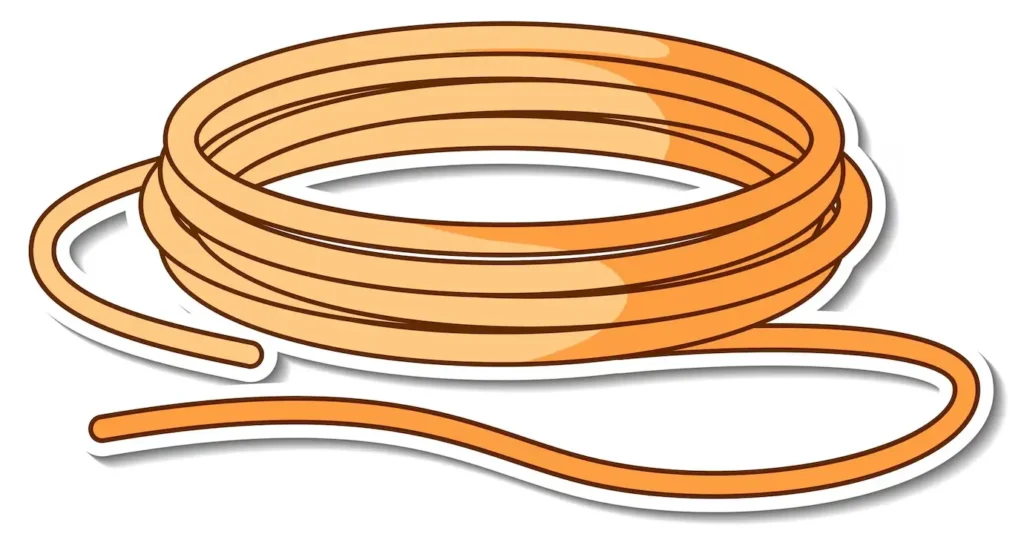Bare copper wire is a type of copper wire that does not have any kind of insulation or coating, making it highly conductive and versatile for a variety of electrical applications.
Due to its natural properties, bare copper wire is commonly used in grounding systems, electrical wiring, and power transmission.
It is composed of 99.9% pure copper, with no coating or insulation, allowing for superior electrical performance in a variety of environments.
What Is The Bare Copper Wire
Bare copper wire refers to copper wire that has no insulation or coating. This type of wire is primarily used in electrical systems due to its exceptional conductivity, making it ideal for a variety of industrial and residential applications.
Without additional layers of insulation, bare copper wire allows for better heat dissipation, contributing to more efficient electrical performance.
Importance of Bare Copper Wire
Bare copper wires play a vital role in electrical systems due to their exceptional conductivity and reliability. Copper is second only to silver in terms of electrical conductivity, making it the preferred choice for most wiring applications.
- High Conductivity: Bare copper wires conduct electricity efficiently with minimal resistance, ensuring optimum performance in power transmission.
- Durability and Flexibility: Copper is not only a good conductor but also durable and flexible, allowing it to be used in a variety of electrical installations without breaking or corroding easily.
- Corrosion Resistance: Although bare copper wire can oxidize over time, it forms a protective layer that prevents further corrosion, increasing its longevity.
- Cost Efficiency: Compared to silver, bare copper wire offers excellent performance at a lower cost, making it the ideal choice for both industrial and residential electrical systems.
When selecting materials for electrical systems, it is essential to understand what bare copper wire is and why it is different. Sv Electricals ensure high-quality standards in their production, making them a reliable provider of these essential materials.
What Does Pure Bare Copper Wire Mean?
Pure bare copper is the most natural and unalloyed form of copper, which means it contains 99.9% pure copper, with minimal impurities and no alloying agents added.
The absence of other metals ensures that it maintains its excellent conductivity and ductility properties.
This type of copper is often used in applications where maximum conductivity is required, as it allows electricity to pass through with minimal resistance.
In electrical systems, pure bare copper is highly valued due to its superior conductor properties, making it the preferred material for wiring, grounding, and electrical connections. Its high conductivity ensures efficient transmission of electrical current, reducing energy losses.
What Does Bare Copper Look Like?
Bare copper wire has a distinctive appearance that sets it apart from other types of wire. When it is new, it is a shiny, reddish-brown color that reflects its purity and quality.
This vibrant color is the hallmark of copper, making it easily recognizable. However, over time, bare copper changes due to exposure to environmental elements.
Air Affects Bare Copper Wire
When bare copper wire is exposed to air, it undergoes a natural process called oxidation. Over time, the surface of the wire reacts with oxygen, resulting in a thin layer called patina.
This layer gives copper a green or brown color, commonly seen in older copper installations.
Although this change in appearance is noticeable, it does not significantly affect the performance of the wire.
The patina acts as a protective layer, preventing further corrosion or deeper oxidation. This means that even though the wire may look old or worn, its conductivity and overall functionality remain largely intact.

Can You Touch Bare Copper Wire Safely?
Yes, you can safely touch bare copper wire if it is not electrified. However, always make sure the wire is disconnected from any power source to avoid electrical shock. For safety, use insulated gloves when handling to minimize the risk.
Safety Concerns with Bare Copper Wire
Risk of electrical shock: The primary hazard is the risk of electrical shock. If the wire is live (carrying current), touching it can cause serious injury or even death, depending on the voltage.
Electrical systems use insulation to protect people from this risk, but if the insulation is damaged or absent, bare copper wire becomes dangerous.
Short circuits: In electrical systems, bare copper wire that touches other conductive materials or wires can create short circuits, potentially causing a fire or damaging equipment.
Corrosion and Exposure: Over time, if bare copper wire is exposed to air and moisture, it can oxidize or rust.
While copper naturally resists corrosion, exposure can increase the risk of electrical faults, making touching the wire even more unsafe.
Reputable suppliers such as sv Electricals provide high-quality, tested wire to ensure maximum safety and reliability in electrical systems.
Should You Use Bare Wire For Electrical Systems?
In electrical systems, bare copper wire plays a vital role in certain applications. However, it is not always suitable for every situation.
While bare wire provides excellent conductivity and is often more cost-effective than insulated wire, the choice between bare and insulated wire depends on the specific needs of the system.
Bare Wire in Electrical Systems
Bare copper wire is commonly used in grounding systems where the main function is to provide a direct path to the earth. In these situations, insulation is unnecessary because the wire needs to interact with the surrounding environment.
Bare copper wire is widely used in applications where its cost-effectiveness and superior conductivity are key factors.
Grounding Systems:
Grounding is essential in electrical setups to prevent electrical shocks and protect equipment from surges or malfunctions.
Copper’s natural ability to conduct electricity makes it the perfect choice for grounding applications. Since there is no need for insulation in this role, bare copper wire provides a more economical and efficient solution for grounding systems.
Transmission Lines:
Bare copper wire is often used in overhead transmission lines where weather and environmental exposure are not an immediate concern. Its high conductivity ensures efficient transmission of electricity over long distances, while its bare form reduces production costs.
Cost-Effectiveness:
Without the added expense of insulation materials, bare copper wire is more economical, making it a preferred choice in many industrial and residential settings.
How Long Does Bare Copper Wire Last?
Bare copper wire is known for its exceptional durability and can last for decades when used under the right conditions.
Its natural resistance to damage, including corrosion and wear, makes it a reliable choice for a wide range of applications.
The absence of an insulating coating allows the wire to effectively handle harsh conditions, making it suitable for use in both indoor and outdoor environments.
Factors Affecting Longevity
While bare copper wire is highly durable, several external factors can affect its lifespan. These include:
- Moisture: Prolonged exposure to moisture can cause oxidation on the copper surface, reducing its longevity over time.
- Air Exposure: When exposed to polluted air, especially in industrial environments, a patina can develop on the wire which can affect its performance.
- Use: Exposure to constant mechanical stress or extreme temperatures can weaken the wire and affect its durability.

Does Bare Copper Wire Corrode Easily?
One of the main advantages of bare copper wire is its natural corrosion resistance, making it a popular choice for a variety of electrical applications.
Copper’s corrosion resistance is particularly strong when it is used indoors or in less harsh environments such as dry, controlled spaces.
In these conditions, copper forms a protective oxide layer on its surface that prevents further corrosion, ensuring longer-lasting and more reliable performance.
Oxidation
Oxidation is a natural process that occurs when bare copper wire is exposed to air and moisture. This results in a thin layer of copper oxide forming on the surface, often giving the wire a greenish-blue patina known as verdigris.
While the patina can affect the wire’s appearance, it generally does not weaken the wire’s structure or conductivity. The layer can act as a protective coating, preventing further oxidation.
Corrosion
Corrosion, on the other hand, is a more aggressive process that deteriorates the material over time. It can occur when copper is exposed to harsh environments, including chemicals or extreme weather.
Unlike oxidation, corrosion weakens the wire, reducing its strength and electrical properties. In severe cases, it can cause the bare copper wire to break or deteriorate.
At Sv Electricals, we ensure that our bare copper wire is produced with high-quality standards, minimizing the risk of both oxidation and corrosion and making it reliable for long-term use.
What Are The Three Types Of Bare Copper Wire?
Bare copper wire, there are three primary types: solid, stranded, and braided. Each type has unique properties and ideal applications.
Solid Copper Wire
Solid copper wire consists of a single, solid strand of copper. This type is known for its excellent conductivity and low resistance, making it suitable for applications where a stable and strong electrical connection is required.
It is often used in permanent installations, such as in residential wiring or electrical panels.
Stranded Copper Wire
Stranded copper wire is made up of many smaller strands of copper that are twisted together. This design increases flexibility, making it easier to handle and install, especially in tight spaces or for applications requiring frequent movement, such as appliances or robotics.
Although it may have slightly higher resistance than solid wire, its flexibility makes up for it in many applications.
Braided Copper Wire
Braided copper wire has many small strands woven together, providing a balance between flexibility and strength. It is often used in applications where motion is expected, such as in flexible connectors or grounding straps.
Braided wire provides better heat dissipation and can handle high-frequency signals better than solid or stranded wire.
Comparison of Flexibility and Conductivity
- Flexibility:
- Solid wire: Least flexible, best for stationary installations.
- Stranded wire: Highly flexible, ideal for dynamic applications.
- Braided wire: Flexible with better structural integrity, suitable for a variety of applications.
- Conductivity:
- Solid wire: Highest conductivity, low resistance
- Stranded wire: Good conductivity, slightly higher resistance due to multiple strands.
- Braided wire: Moderate conductivity, effective in high-frequency applications but may have slightly higher resistance.
Frequently Asked Questions About What Is The Bare Copper Wire
What Is The Meaning Of Bare Copper Wire?
Bare copper wire refers to copper wire that is free of any insulation or coating, making it ideal for electrical applications due to its excellent conductivity.
What Is The Difference Between Bare Copper Wire And Pure Copper Wire?
Bare copper wire is simply copper wire without insulation, on the other side pure copper wire emphasizes the absence of alloys or impurities, ensuring maximum conductivity in electrical systems.





